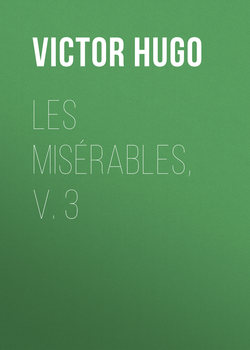Читать книгу Les Misérables, v. 3 - Victor Hugo, Clara Inés Bravo Villarreal - Страница 26
Book III
GRANDFATHER AND GRANDSON
CHAPTER V
MARIUS MEETS A CHURCHWARDEN
ОглавлениеMarius had retained the religious habits of his childhood. One Sunday, when he went to hear Mass at St. Sulpice, in the Chapel of the Virgin to which his aunt took him when a boy, being on that day more than usually absent and thoughtful, he placed himself behind a pillar, and knelt, without paying attention to the fact, upon a Utrecht velvet chair, on the back of which was written, "Monsieur Mabœuf, Churchwarden." The Mass had scarce begun when an old gentleman presented himself, and said to Marius, —
"This is my place, sir."
Marius at once stepped aside, and the old gentleman took his seat. When Mass was ended Marius stood pensively for a few moments, till the old gentleman came up to him and said, —
"I ask your pardon, sir, for having disturbed you just now, and for troubling you afresh at this moment; but you must have considered me ill-bred, and so I wish to explain the matter to you."
"It is unnecessary, sir," said Marius.
"No, it is not," the old man continued, "for I do not wish you to have a bad opinion of me. I am attached to this seat, and it seems to me that the Mass is better here, and I will tell you my reason. To this spot I saw during ten years, at regular intervals of two or three months, a poor worthy father come, who had no other opportunity or way of seeing his son, because they were separated through family arrangements. He came at the hour when he knew that his son would be brought to Mass. The boy did not suspect that his father was here – perhaps did not know, the innocent, that he had a father. The latter kept behind a pillar so that he might not be seen, looked at his child and wept; for the poor man adored him, as I could see. This spot has become, so to speak, sanctified for me, and I have fallen into the habit of hearing Mass here. I prefer it to the bench to which I should have a right as churchwarden. I even knew the unfortunate gentleman slightly. He had a father-in-law, a rich aunt, and other relatives, who threatened to disinherit the boy if the father ever saw him, and he sacrificed himself that his son might one day be rich and happy. They were separated through political opinions, and though I certainly approve of such opinions, there are persons who do not know where to stop. Good gracious! because a man was at Waterloo he is not a monster; a father should not be separated from his child on that account. He was one of Bonaparte's colonels, and is dead, I believe. He lived at Vernon, where I have a brother who is curé, and his name was something like Pontmarie or Montpercy. He had, on my word, a great sabre-cut."
"Pontmercy," Marius said, turning pale.
"Precisely, Pontmercy; did you know him?"
"He was my father, sir."
The old churchwarden clasped his hands and exclaimed, —
"Ah! you are the boy! Yes, yes, he would be a man now. Well, poor boy! you may say that you had a father who loved you dearly."
Marius offered his arm to the old gentleman and conducted him to his house. The next day he said to M. Gillenormand, —
"Some friends of mine have arranged a shooting-party; will you allow me to go away for three days?"
"Four," the grandfather answered; "go and amuse yourself." And he whispered to his daughter with a wink, "Some love affair!"
